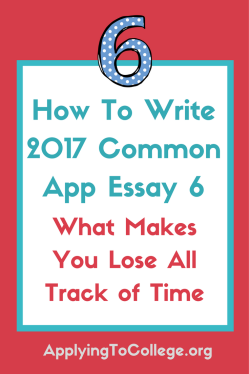You’re writing a Common Application essay.
How do you choose which essay to write?
In this 7-part series I’m helping you figure out which question on the 2017 Common Application essay is right for you.
For the complete list of 2017 Common App essay questions click here.
Ready for #6? Let’s do it!
Common Application Essay Prompt #6:
Describe a topic, idea, or concept you find so engaging that it makes you lose all track of time. Why does it captivate you? What or who do you turn to when you want to learn more?
Is this Prompt for You? Look at the Keywords:
“Topic, Idea or Concept”…”Lose All Track of Time”…”Why”…”What or Who Do You Turn To”
Do the Keywords Apply to You?
- “Topic, Idea, or Concept” is a very broad phrase. That’s good! It means you can choose almost anything, large or small.
- “Lose All Track of Time” is self-explanatory. You’ve found yourself so engrossed in something that you didn’t realize how much time had passed.
- “Why Does it Captivate You?” The key word here is why. You need to figure out why you find this topic so engaging, exciting, or thought provoking.
- “What or Who Do You Turn To When You Want to Learn More?” Ah! This means you’re an independent learner. It doesn’t really matter how you learn on your own—whether you ask a teacher, search Google, read books, watch videos, etc. What matters is that you find a way to satisfy your curiosity.
What Can Colleges Learn About You From This Question?
- Your curiosity
- Your resourcefulness
- Your level of independence
- The type of learner you’ll be when you get to college
- The ideas or issues that are meaningful to you
Pitfalls to Avoid
- This Question Has 3 Parts—Don’t Leave Any Out. They are: 1. Topic, idea, or concept; 2. Why it captivates you; 3. Who or what you turn to when you want to learn more.
- Don’t Shortchange “Why.” Discussing “why” is one of the most important things you can do in an essay. Through why, schools learn a whole lot about you—they see how you think, what you care about, what concerns you. This is the part that helps differentiate you, that helps show what makes you, you.
 CAUTION!
CAUTION!
DON’T GET CAUGHT IN THE BORING TRAP!
Do you lose track of time when you’re in your room or with your friends? Do you zone out when you go for long walks in the woods?
Be careful of the Boring Trap.
Because this question can lead you down that path, no question about it.
Quite frankly, most of the best essay answers don’t have nice, easy stories. They’ve got an obstacle thrown in your path, a problem you have to solve, a decision you have to make, or some other circumstance that’s helped shape you into who you are.
This question doesn’t remind you to think about that. It should.
Let me give you an example. Let’s say you want to write about how you lose track of time with your friends. You’ve got great qualities—you’re friendly and loyal—and being with your friends captivates you because you love the discussions you have. You turn to your friends when you want information or help, and they support you. And that might be your essay.
It’s nice, but it’s “so what.” It doesn’t show a journey, an obstacle, a decision, a realization or growth. It doesn’t show how you started in one place and finished in another, or how you’ve built your character. It’s not going to be a memorable essay. You’ve been caught in the Boring Trap.
Here’s an example of How To Get Out of the Boring Trap:
Boring Essay—Before and After
Boring: Joanne loses all track of time in her room when she’s painting. It captivates her because she loves art and color. She likes to paint alone, and be alone with her thoughts and her imagination. She enjoys being surrounded by the paintings on her walls because it feels homey, and she’s made her room her hideaway. When she wants to learn more she takes a painting class at the art barn down the street. Next month she’s going to try watercolor.
Let’s look at what the reader learns: Joanne is artistic and loves color. She’s imaginative and likes feeling homey. She takes painting classes to learn more. Not much else. The essay doesn’t have a story. We don’t get a sense she’s grown at all or been shaped by her talent.
Same Topic, Not Boring: Joanne loses all track of time in her room when she’s painting. It captivates her because she loves art and color. As a matter of fact, she’s been influenced by two famous painters, Grandma Moses and Georgia O’Keefe, two artists who used color in very different ways. Joanne tries to figure out why they chose the colors they did and how they interpreted their worlds, and then she tries to find an original way to interpret hers. Joanne’s first grade teacher tried to make her draw people with proper fingers and toes, and at first she did. But then she rebelled. She decided she didn’t have to be like anyone else and has been drawing people and things the way she wants to ever since. Art gives her an expressive outlet for her thoughts and her imagination. It’s helped her develop her sense of personal expression. She also loves to learn, and whenever she can she takes art classes at the art barn down the street. She reads about her favorite painters and she’s learning about new ones. Next month she’s going to experiment with watercolor. She’s not sure what subject she’ll be painting or what she’ll learn about herself, but she can’t wait to get started.
What does the reader learn? Much more.
- We learn how she thinks: Joanne discusses how other artists have influenced her and made her think about her own style.
- She adds interesting detail: By discussing other artists, she shows that she has detailed knowledge about a subject that interests her.
- She adds more “why.” Besides saying she loves art and color she says that art gives her an outlet for her thoughts and imagination and helps her find her own personal expression. This adds more insight and meaning to her essay.
- She tells a story of a formative experience that shaped her character.
- She adds more qualities that express her personality. Besides being artistic and loving color, we learn she has an independent nature and is always learning and thinking of ways to improve.
Everything Joanne added helps her essay be more original and interesting. It’s uniquely her. It shows how she’s grown, how she thinks, and what’s meaningful to her. She’s avoided the boring trap.
#6 is a brand new prompt and I’m excited to see the essays students will write this year!
Read the entire series:
How to Write Common App Prompt #1: Background, Talent, Identity, or Interest
How to Write Common App Prompt #2: The Lessons We Take From Obstacles
How to Write Common App Prompt #3: Challenged a Belief or Idea
How to Write Common App Prompt #4: A Problem You’ve Solved or Would Like to Solve
How to Write Common App Prompt #5: An Accomplishment, Event, or Realization
How to Write Common App Prompt #6: Topic, Idea or Concept that Makes You Lose Track of Time
Coming Soon:
How to Write Common App Prompt #7: Topic of Your Choice
For the entire list of 2017 Common App essay prompts click here.
If you’re not familiar with the Common Application, go to their website. They also have a very helpful Facebook page.
Sharon Epstein is a Writers Guild Award-winner and two-time Emmy Award nominee, teaching students around the world how to master interview skills, write resumes, and transform their goals, dreams and experiences into memorable college application essays. She works with students everywhere: in-person, by phone, FaceTime, Skype and email. Visit my website for more info. Connect on Google+, Pinterest and Twitter.












